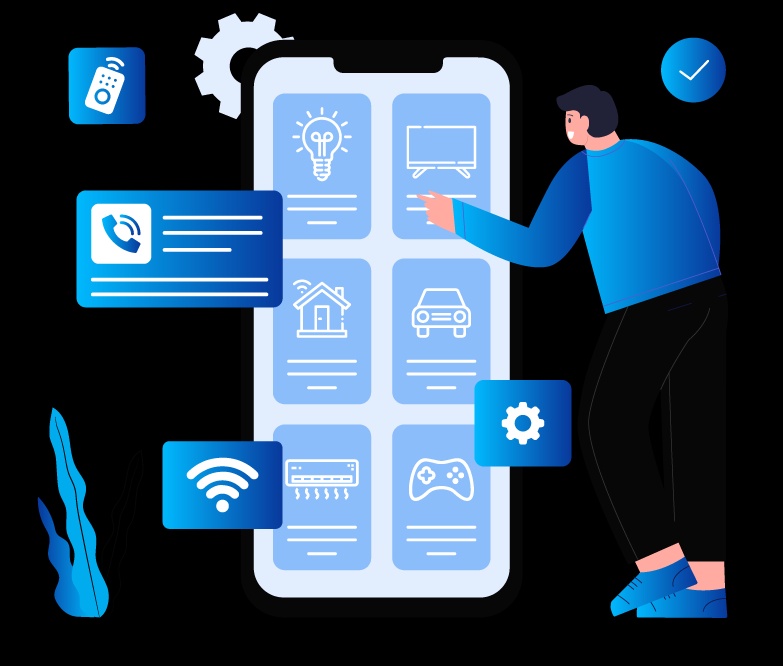In the digital age, technological advancements have become the cornerstone of progress across industries. Among these innovations, the Internet of Things (IoT) stands out as a transformative force, reshaping how businesses operate and interact with their surroundings. Central to this revolution is IoT mobile app development, which has ushered in a new era of connectivity, efficiency, and innovation across various sectors.
What is IoT Mobile App Development?
IoT mobile app development involves creating applications that facilitate communication between connected devices and enable users to monitor, control, and analyze data remotely. These apps leverage the power of IoT technology to collect real-time information from sensors, machines, and other smart devices, providing users with valuable insights and enhancing decision-making processes.
Impact on Industries
- Manufacturing
The advent of IoT mobile app development has sparked a revolution within the manufacturing sector, ushering in an era of smart factories. These factories leverage interconnected devices and sensors embedded within machinery to monitor production processes in real time. By analyzing data collected from these devices, manufacturers can optimize workflow, identify inefficiencies, and preemptively address maintenance issues. The result is a dramatic increase in productivity, significant reductions in downtime, and a notable enhancement in product quality.
- Healthcare
Within the healthcare industry, the integration of IoT mobile apps has brought about a profound transformation in patient care and management practices. Wearable devices equipped with an array of sensors now have the capability to monitor vital signs, track medication adherence, and even detect potential health risks. Leveraging these IoT-enabled mobile apps, healthcare providers can remotely monitor patients, craft personalized treatment plans, and intervene proactively when necessary. This holistic approach not only leads to improved patient outcomes but also contributes to the reduction of healthcare costs in the long run.
- Retail
The retail landscape has undergone a seismic shift with the emergence of IoT mobile app development, paving the way for highly personalized shopping experiences and streamlined inventory management processes. Beacon technology, for instance, empowers retailers to deliver targeted promotions to customers based on their precise location within stores, fostering heightened engagement and driving sales. Furthermore, IoT-powered inventory management systems offer real-time insights into stock levels, effectively reducing instances of out-of-stock products and bolstering overall operational efficiency.
- Transportation
In the transportation sector, IoT mobile app development has yielded significant advancements, particularly in the realms of logistics and fleet management. Connected sensors and GPS technology enable the seamless tracking of shipments, facilitating route optimization and enhancing delivery accuracy. Moreover, IoT-enabled maintenance systems have the capacity to predict equipment failures before they occur, thereby minimizing downtime and ensuring the reliability of transportation networks. These innovations not only improve operational efficiency but also enhance the overall safety and reliability of transportation systems.
- Agriculture
Within the realm of agriculture, IoT mobile apps have spearheaded a revolution, introducing precision farming techniques that optimize crop yields while simultaneously minimizing resource usage. Through the deployment of soil sensors, drones, and weather stations, farmers can gather a wealth of data pertaining to soil moisture, temperature, and environmental conditions. Armed with this information, they can make informed, data-driven decisions regarding irrigation schedules, fertilization practices, and pest control measures. The adoption of these precision farming techniques not only leads to increased agricultural productivity but also fosters sustainability by reducing water and chemical usage, thereby mitigating environmental impact.
Challenges and Opportunities
While IoT mobile app development offers immense potential, it also presents challenges that must be addressed. Security concerns, such as data breaches and privacy violations, remain a primary consideration in IoT deployments. Additionally, interoperability issues between different IoT devices and platforms can hinder seamless integration and data exchange.
However, these challenges also present opportunities for innovation and growth. As demand for IoT solutions continues to rise, there is a growing need for skilled developers capable of designing and implementing secure, scalable, and interoperable IoT mobile apps. Moreover, advancements in cloud computing, artificial intelligence, and edge computing are driving the evolution of IoT technology, opening new possibilities for its application across industries.
Conclusion
IoT mobile app development is transforming industries by enabling connectivity, automation, and data-driven decision-making. From manufacturing and healthcare to retail and agriculture, the impact of IoT technology is evident in improved efficiency, productivity, and customer experiences. As businesses embrace IoT solutions to stay competitive in a rapidly evolving digital landscape, the role of skilled developers in driving innovation and addressing challenges cannot be overstated. With continued advancements in technology and collaboration across sectors, the potential for IoT to revolutionize industries is limitless. Appikr Labs is contributing everyday to the growth of IoT app development.


No comments yet